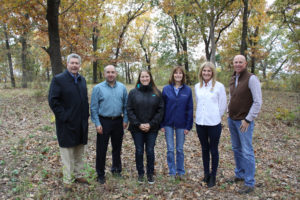
RSU President Dr. Larry Rice, Joe McGaver and Stephanie Taylor with Enbridge Energy, Ginny Moore with The Conservation Fund, Anita Barstow with the U.S. Fish and Wildlife Service, and Dr. Keith Martin, Dean of RSU’s School of Arts and Sciences. Additional photos from the event
Rogers State University, the RSU Foundation, The Conservation Fund and the U.S. Fish and Wildlife Service on Monday formally dedicated a research station near Claremore intended to conserve Oklahoma’s native woodlands and aid in protection of endangered species such as the American Burying Beetle.
The RSU Scientific Field Research Station is a collaborative public-private partnership to allow RSU faculty and students conduct research on the 260-acre, undeveloped site about five miles southwest of Claremore. The property is owned by the RSU Foundation for exclusive use by RSU faculty, students and other researchers coordinated through the university.
“For RSU faculty and students in our environmental conservation and science programs, access to these undeveloped lands enhances classroom learning and provides unparalleled opportunities for them to conduct original research that will help future generations preserve and protect our natural resources,” said Dr. Keith Martin, Dean of RSU’s School of Arts and Sciences and Biology Professor.
The RSU Foundation acquired the property more than a year ago, and university administrators opted for a “soft launch” for initial faculty and student research. Since September 2016, the site has hosted more than 400 faculty and student visits for research projects.
The forested woodlands are being conserved, in part, by funding and technical assistance made available as mitigation for impacts caused by construction and maintenance of Enbridge Flanagan South Pipeline in partnership with the U.S. Fish and Wildlife Service. The mission of the RSU Scientific Field Research Station is to collect and share the scientific knowledge needed to make significant contributions to the understanding and protection of native upland/wetland woodlands of northeastern Oklahoma.
The collaboration between these public and non-profit groups seeks to provide perpetual conservation of habitat critical to the recovery of the endangered American Burying Beetle, migratory songbirds, and other sensitive plants and animals.
“This is a wonderful example of how wildlife habitat protection and educational advancement can complement each other,” said Ginny Moore, Midwest Field Representative with The Conservation Fund. “We are truly honored to partner with Rogers State University, the RSU Foundation and the U.S. Fish and Wildlife Service in conserving this sensitive, native habitat and providing a unique setting for research, training and hands-on learning.”
Anita Barstow, Biologist with the U.S. Fish and Wildlife Service and an RSU alumnus, spoke at the event saying the U.S. Fish and Wildlife Service is excited to see the positive conservation and education benefits achieved through its partnerships with RSU and The Conservation Fund using voluntary conservation funds from Enbridge Energy Partners. “Together with our partners, we were able to create signification conservation benefits for northeast Oklahoma landscapes while providing an area for RSU students to perform important research in Northeast Oklahoma,” Barstow said.
These efforts contribute to the preservation of the rich geologic, archaeological, and biodiversity found in northeastern Oklahoma, and provide relevant research and education opportunities for faculty and students in RSU’s academic departments, especially its Environmental Conservation academic program.
RSU President Dr. Larry Rice said students and faculty in the RSU conservation and science programs would have access to some of the state’s best natural resources, giving them a leg up in their studies.
“I doubt you’ll find many regional universities where students and faculty have more access to environmental research facilities,” he said. “We are deeply grateful to the RSU Foundation and our partners in the U.S. Fish and Wildlife and The Conservation Fund for their assistance in making these opportunities possible for our faculty and students.”
Also attending the event were Cherokee Nation Councilor Keith Austin, Rogers County Commissioner Ron Burrows, alumni from RSU’s environmental conservation program, and nearby landowners.
RSU degree programs related to the research station include its bachelor’s degree in biology with options in environmental conservation or biology, along with associate degrees in biological science or physical science with options in geology, chemistry or engineering/physics/math.
In addition to the new research station, RSU students have access to a 100-acre, on-campus nature reserve that serves both research and recreation purposes. The on-campus nature reserve is open to the public, while access to the Scientific Research Station is restricted and requires advance approval from the RSU Department of Biology.
